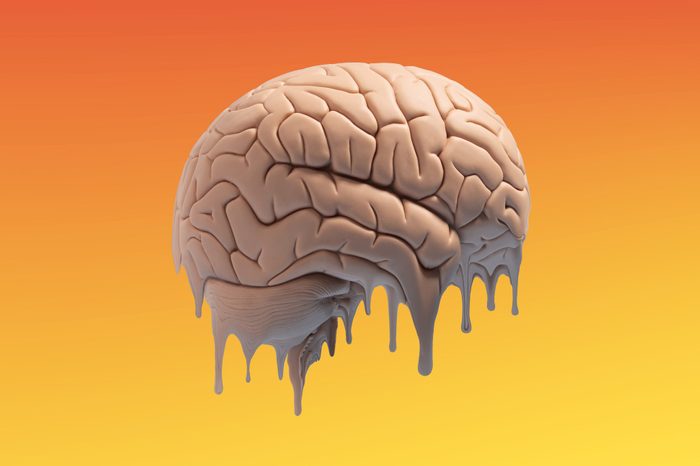Short-Term Memory Loss: A Neurology Doctor Reveals What Causes It, and When to Seek Help
Updated: Oct. 13, 2023

Learn about the causes of short-term memory loss and find out when it's a good idea for you or a loved one to seek professional care.
Forget where you set down your phone? Suddenly can’t remember what you did last Sunday when you’re catching up with a friend? Short-term memory loss happens to many of us—the result of stress, maybe not getting enough sleep. But it’s always frustrating, and even a little concerning…so when does memory loss signal something more serious, like the onset of dementia?
Short-term memory loss is when you can’t recall things within the last hours, days or weeks, Joel Salinas, MD, clinical assistant professor of neurology at NYU Langone and chief medical officer at Isaac Health, tells The Healthy @Reader’s Digest.
What causes short-term memory loss?
“There’s all sorts of different causes of short-term memory loss,” Dr. Salinas says. More severe circumstances like head injuries and neurological disorders can be factors, but so can a simple nutritional deficiency, as well as depression or side effects from a medication.
“Alzheimer’s is the one that looms largest for most people, but part of why it’s so important to be evaluated is that some causes are reversible or will go away with time,” says Carolyn A. Fredericks, MD, an assistant professor of neurology at Yale School of Medicine. “It’s also possible that what seems at first to be a short-term memory problem is actually more of a problem with attention, or with organization.”
“I’ve certainly seen patients whose symptoms resolve completely after removing problem medications, treating their thyroid disorder or addressing their sleep apnea,” Dr. Fredericks says.
Dr. Salinas says some short-term memory loss can be reversed; other cases are more serious. But doing something about it can prevent it from progressing.
Here’s a good way to tell if your memory loss is natural from aging, or if it’s a sign of something like dementia: You’ll have benign forgetfulness—that’s when you forget details of something from time to time. That’s normal as we age (and as the responsibilities of life get more challenging to manage!).
“But when we become concerned is when these lapses occur over months or years,” Dr. Salinas says.
Over 40? Here Are 9 Clever Memory Exercises to Start Doing Today
When should I be worried about short-term memory loss?
If you have those lapses of forgetting details regularly, and can’t recall details like the names of family members and what year it is, that’s when to seek help, Dr. Salinas advises.
Dr. Fredericks considers red flags when, for instance, family members tell you you’re repeating questions or stories within the same conversation. Other signs that it’s time to seek help include having a hard time finding your way home from familiar places, or struggling to find the right words more than in the past. It’s a good idea to seek help if you keep losing track of important objects like your keys, wallet, phone or purse, she adds.
Take This Attention Span Quiz To Measure How Well You Actually Stay Focused
How to address short-term memory loss
If you think something could be up, talk to your primary care doctor. They may not be comfortable doing an assessment, but some may see if they can check for other ailments that may cause memory loss. If you don’t get answers, reach out to a behavioral neurologist (also called a cognitive neurologist) or neuropsychologist. If you’re older, try a geriatric psychiatrist or geriatrician.
Treatments vary depending on the type of memory loss, or what’s causing it. A doctor can use medications and therapies like cognitive rehabilitation
“If it’s a reversible cause, it can be reversed,” Dr. Salinas says. “If it’s a little bit more complex, it’s a little bit more about slowing the decline of someone’s functioning.”
Eating This Berry Can Improve Your Heart & Brain Health in 8 Weeks, New Study Says
Can I prevent short-term memory loss?
Some short-term memory loss comes with age, but research is finding that there’s a lot you can do to possibly prevent it or make it less intense. Staying active physically, learning new skills and sticking to a daily routine are all good ways to stay sharp.
Here’s How Much Exercise You Need to Keep Your Brain Sharp, a Recent Study Says
How do I get help for short-term memory loss?
It may be hard to find help, depending on where you live, Dr. Salinas notes. About half of the country doesn’t have nearby access to these specialists. They’re often only at academic medical centers or hospitals with centers of excellence—that’s why experts call these neurology deserts.
“There’s still a huge gap in care,” Dr. Salinas says. The wait time to get an appointment can also be anywhere from six to 12 months. Because early detection can be instrumental to avoid progression—just like cancer—there’s a real need for people to get care ASAP, Dr. Salinas adds.
That’s one of the reasons why Dr. Salinas started Isaac Health, an online memory care clinic addressing memory issues in all ages. They can do the tests needed to detect a wide range of memory issues—and give treatments—completely online, and usually in a matter of days.
“You may have a hard time finding somebody, but there are options available,” he says. “Early detection is key. You can intervene.”
















